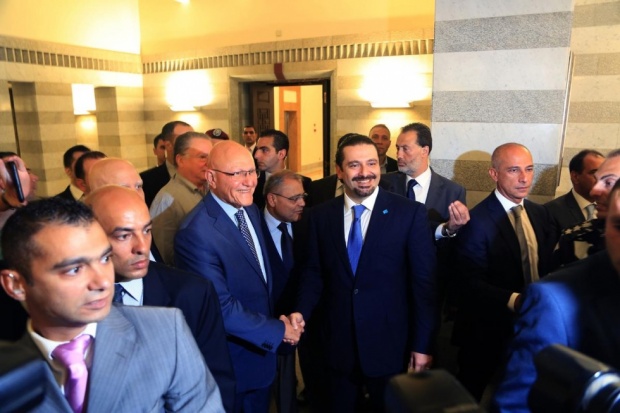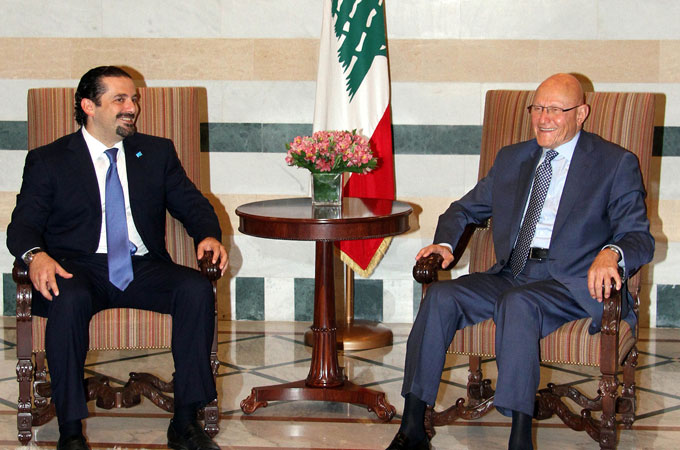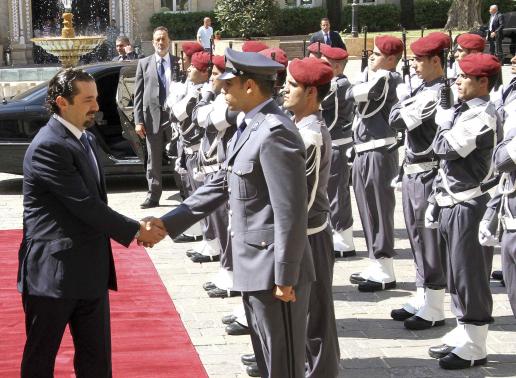


Former Lebanese Prime Minister Saad Hariri, considered Lebanon’s most influential Muslim Sunni politician, returned unexpectedly to Lebanon Friday after three years of self-imposed exile. His return comes amid heightened tensions in Lebanon after Sunni extremists from Syria overran a town in the east, along the Lebanon-Syria border as well as the growing perception that there is a leadership gap among the country’s Sunni Muslims.
A smiling and jovial Hariri was seen on television screens hugging Sarail employees and shaking hands with security personnel, individuals he knew well, along with reporters assigned the beat. A short meeting with the sitting premier, Tammam Salam, followed although observers were surprised that it lasted less than 30 minutes. No news conference was held at the end of this gathering with Hariri telling reporters that “God will protect everyone,” and that the country would be saved. For some, that statement was alarming, indicating that the former prime minister was taking a risk by returning without a prior accord with Hezbollah and others regarding his safety. With no prior announcement, Hariri arrived at the Lebanese government’s headquarters in Beirut on Friday, where he met Prime Minister Tammam Salam.
Hariri left Lebanon in 2011 after his government was toppled by a coalition including the Shia group Hezbollah, and has since spent his time between France and Saudi Arabia, whose rulers support him. Politicians and public figures expressed hope that his return would help stabilise Lebanon, which is plagued by violence and stuck in political deadlock. Hariri also met with Interior Minister Nohad Machnouk and US Ambassador David Hale. There was support from other prominent figures including Christian Maronite Patriarch Beshara al-Rai and Parliament Speaker Nabih Berri, a Shia.
Hariri’s visit follows a deadly incursion by fighters who crossed from Syria last Saturday and seized the town of Arsal in the northeast, where tens of thousands of Syrian refugees have taken shelter. The gunmen withdrew on Wednesday after five days of battles with the army. The fighters included men affiliated to Islamic State, which has seized large areas of Iraq and Syria. The fighting was the most serious spillover yet of the Syrian conflict and triggered unrest in other parts of Lebanon, notably the predominantly Sunni northern city of Tripoli.
‘Presence very important’ With the influence of Muslim armed groups expanding in neighbouring Syria and Iraq, Hariri’s arrival was greeted with relief by many Lebanese concerned that his absence had left Sunnis vulnerable to influence from the armed groups. His return coincides with growing signs of alarm in Saudi Arabia about the Islamic State’s reach, the Reuters news agency reported. Hariri announced this week that Saudi Arabia would donate $1bn in military aid to Lebanese security forces to help them in the fight against the armed groups.
Walid Jumblatt, Lebanon’s most influential Druze leader, who describes himself as a centrist but has switched alliance many times in the last decade, told the Reuters news agency Hariri’s return was "very positive". "Facing the radicals, his presence is very important." Michael Young, a commentator on Lebanese politics, said that since Hariri left "a vacuum has formed in the Sunni community". "This was becoming increasingly dangerous because this community was becoming more and more radicalised," he said. "[Hariri’s] return is probably an effort with the Saudis to reassert a certain amount of control over the Sunni community."



